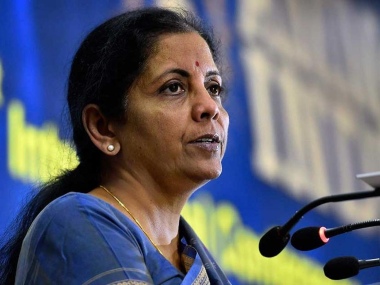New Delhi: Years before Finance Minister Nirmala Sitharaman’s major announcement to slash corporate tax, the late Arun Jaitley — Union finance minister in 2016 — had promised that before the end of the NDA government’s tenure, the Narendra Modi government will move to a single 25 percent corporate tax rate for all companies while eliminating tax concessions to galvanise economic growth. The announcement came a little late in the backdrop of faltering growth, but nevertheless was a much-needed bold and significant move — one that was welcomed warmly by market, accompanied by a massive surge in the Sensex and Nifty. During the back-and-forth discussion at North Block on company taxation in 2016 for cutting rates and broadening the base to boost corporate growth and job creation, three issues were deliberated at length among bureaucrats. First, the corporate tax of 30 percent — which along with surcharge on total tax liabilities and cess came to a statutory rate of 34 percent — was higher when compared with other BRICS countries, Brazil, Russia, China and South Africa. Secondly, the existing corporate taxation was biased against small and labour-intensive companies as flagged by the 2010 tax code bill, which was strongly in favour of removing tax concessions and the discretionary power of tax authorities, and improving the ease of paying taxes for domestic and foreign firms. Third and most important was the idea that lowering corporate tax will also help in reducing distortions that sneak in due to concessions across firms of different sizes.
No doubt corporate tax is estimated to be a key revenue source — more than 20 percent of total taxes and around four percent of the GDP of the country, but there was an urgent need to ease tax compliance and eliminate disincentives for firms to grow. Another crucial question is whether the government treasury was receiving the statutory rate of 34 percent from corporates in taxes. The answer is No. The analysis of tax rates, exemptions, special rates, deferrals, rebates, deductions etc as well as collections of FY 2013-14 — which became the basis of discussion — had suggested that the tax rate on companies was only 23 percent, while tax concessions accounted for around 0.8 percent of GDP. The foregone revenue of Rs 1.45 lakh crore as estimated by the finance ministry after the announcement of new measures will be less than the revenue lost due to various special rates prevalent so far. The new tax rate of 15 percent for new domestic manufacturing companies is another welcome step because there was heartburn among the companies operating under Special Economic Zones (SEZs) and outside its purview. The generous tax incentives despite low employment rate in SEZs and mounting cases of fraudulently claimed tax concessions called for a level playing field for the manufacturing companies. Another major beneficiary of the finance minister’s announcement will be small and medium-sized companies in the manufacturing sector — the distortions and discrepancies that bureaucrats had discussed in the 2016 meeting. Many of these companies were imposed with 33 percent tax along with a seven percent surcharge that had become serious obstructions, resulting in stacking non-tax compliance cases and contributing to an economic growth slowdown. As per new big bang reforms, companies paying an effective tax rate of 25.17 percent inclusive of surcharge and cess will not be required to pay Minimum Alternate Tax (MAT).
Moreover, companies that want to continue with concessions will get relief in MAT. This system was in force to ensure that if a company’s tax liability is below 18.5 percent of its book profits, the book profits are deemed to be taxable income and are subjected to the MAT at a rate of 18.5 percent along with other surcharges. Now, this has been reduced to 15 percent. The government in the final blueprint can fine tune the concessions opted for by companies operating in the hinterland by making them more accountable on the basis of output and employment. However, this is not the only effective remedy in the hands of the finance minister. Another step may also include relief for foreign investors paying more than those in G20 countries and boost agriculture and allied sectors. The ministry can also look at several other measures including more reforms in presumptive tax that was discussed and subsequently launched by Jaitley when he increased turnover limit, since there is scope of further reform in the presumptive taxation system.


)

)
)
)
)
)
)
)
)



